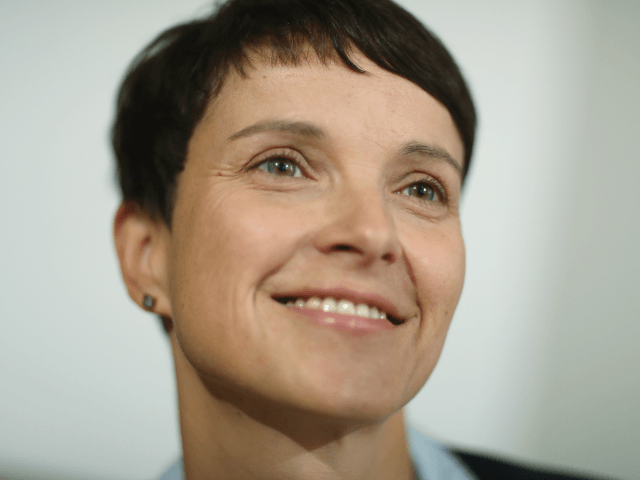BERLIN (AP) — They are the would-be Donald Trumps of Europe and they are coming together in a bid to gain influence in some of the continent’s most powerful nations.
A day after the inauguration of the 45th president of the United States, nationalist leaders from Germany, France, the Netherlands and Italy plan to spell out a vision for Europe that will echo many of Trump’s talking points on immigration, Islam and relations with Russia.
The meeting Saturday in Koblenz, Germany, brings together politicians who are hoping to score Trump-style political upsets in their respective countries this year with policies that are far to the right of the continent’s established parties
It also marks the first official appearance of Frauke Petry — the figurehead of Alternative for Germany — alongside Marine Le Pen of France’s National Front, an alliance that would have been toxic to any mainstream German politician’s ambition just a few years ago, breaking the post-Nazi-era taboo of showing any support for the far right.
But Le Pen, who inherited the party’s leadership from her father Jean-Marie in 2011, has ditched the National Front’s long-standing anti-Semitism to focus on economic protectionism and fears of Islam, boosting its fortunes among French voters before the spring presidential election.
For her part, Petry has turned the four-year-old Alternative for Germany, or AfD, into a formidable force. Pollsters predict the party will enter the German parliament for the first time this fall, seizing a double-digit share of the vote amid widespread dissatisfaction over Chancellor Angela Merkel’s refugee policy.
They will be joined in Koblenz by Matteo Salvini, the leader of Italy’s Northern League, and Dutch anti-Islam politician Geert Wilders, whose Party for Freedom is tipped to gain the largest percentage of votes in the Netherlands’ March 15 parliamentary election. The party is shunned by its rivals, though, and unlikely to gain sufficient support for a coalition government.
While Le Pen, Wilders and Salvini have met in the past, Petry’s appearance has raised eyebrows in Germany.
Senior members of AfD had previously dismissed the idea of working with Le Pen’s National Front, and some still do.
Officially, the meeting is being organized by Petry’s husband Marcus Pretzell, a European AfD lawmaker. Pretzell is part of the Europe of Nations and Freedom group in the European parliament, which is dominated by deputies from the National Front.
According to the official program, Le Pen, Wilders and Salvini will speak in the morning, after which the event will be “crowned by Frauke Petry.”
Emmanuelle Reungoat, a political scientist at the University of Montpellier, France, said that although the parties have very different origins, a brief, media-friendly appearance would offer the participants an opportunity to present themselves as leaders with international stature.
“What interests them is to profit from the popularity each may have,” Reungoat said.
Petry’s decision to share a platform with Le Pen may reflect the party’s stated tactic of “carefully planned provocation” that has served to keep AfD in the headlines for months, according to David Bebnowski, a political scientist at the University of Goettingen. Shortly after announcing the meeting, organizers banned a number of prominent German media outlets from attending, ensuring even greater attention for the event.
Bebnowski said that the embrace of Le Pen, Wilders and Salvini also shows AfD’s continued shift to the right, a direction that doesn’t seem to have harmed the party, even when some of its own members questioned the direction it was heading in.
Claudia Martin, who was elected as an AfD member of the Baden-Wuerttemberg state assembly last year, said that she joined the party in 2013 because it offered an opportunity to become involved in politics that didn’t seem possible in established parties.
Last month, following a lengthy dispute over anti-Semitism in her regional party chapter, she quit AfD. “The party had an opportunity to draw a clear line and failed to do so,” Martin told The Associated Press.
Trump, meanwhile, has become a “hero” to some in the party who believe in overturning the old order, she said.
Herfried Muenkler, a professor at Berlin’s Humboldt university, said that the parties meeting on Saturday reflect a growing desire in their countries — also seen in the U.S. — to withdraw from politics at the global level and bring it back to the nation state.
“If they were ever in a position to see those policies through, though, they will find themselves confronting each other,” Muenkler said.
Left-wing groups have announced plans to protest the meeting, which will be held in a large congress center by the banks of the River Rhine. Behind it lies what remains of the historic center of Koblenz, a city that was all but flattened by the Allies in their advance against Nazi Germany toward the end of World War II.

COMMENTS
Please let us know if you're having issues with commenting.